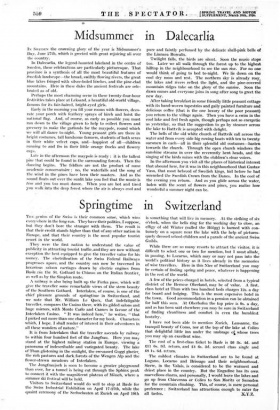Midsummer in Dalecarlia
Ix SWEDEN the crowning glory of the year is Midsummer's Day, June 27th, which is greeted with great rejoicing all over the country.
In Dalecarlia, the legend-haunted lakeland in the centre of Sweden, these celebrations are particularly picturesque. That province is a synthesis of all the most beautiful features of Swedish landscape—the broad, swiftly flowing rivers, the great blue lakes fringed with silver-holed birches, and the pine-clad mountains. Here in these dales the ancient festivals are cele- brated as of old.
Perhaps the most charming scene in these twenty-four-hour festivities takes place at Leksand, a beautiful old-world village, famous for its fair-haired, bright-eyed girls.
Early in the morning you fill your rooms with flowers, deco- rate your porch with feathery sprays of birch and hoist the national flag. And, of course, as early as possible you must run down to the village green to help to collect flowers and greenery to. make the garlands for the maypole, round which we will all dance to-night. Young peasant girls are there in bright costumes, tall handsome farmers, students of both sexes in their white velvet caps, and—happiest of all—children running to and fro in their little orange frocks and flowery caps.
Late in the afternoon the maypole is ready : it is the tallest pine that could be found in the surrounding forests. Then the dancing begins. The fiddlers are not the product of some academic conservatoire ; no, the waterfalls and the song of the wind in the pines have been their masters. And as the sound floats out over the sunlit lake you feel that the music is true and you too must dance. When you are hot and tired you walk into the deep forest where the air is always cool and
pure and faintly perfumed by the delicate shell-pink bells of the. Linnaea Borealis.
Twilight falls, the birds are silent. Soon the music stops too. Later we all walk through the forest up to the highest hilltop in the neighbourhood to see the sun rise. For no one would think of going to bed to-night. We lie down on the cool dry moss and rest. The northern sky is already rosy, the lakes and rivers reflect the, light„ and the pine-covered mountain ridges take on the glory of the sunrise. Soon the dawn comes and everyone joins in song after song to greet the new day.
After taking breakfast in some friendly little peasant cottage with its hand-woven tapestries and gaily painted furniture and delicious coffee (that is the one luxury of the poor peasant) you return to the village again. Then you have a swim in the cool lake and feel fresh again, though perhaps not so energetic as yesterday, so that the suggestion to go by steamer across the lake to Rattvik is accepted with delight.
The bells of the old white church of Rattvik call across the water and from every side big rowing boats with ten to twenty oarsmen in each—all in their splendid old costumes—hasten towards the church. Through the open church windows the sunshine streams in over the reverently bent heads, and the singing of the birds mixes with the children's clear voices.
In the afternoon you visit all the places of historical interest that abound here, for it was in this neighbourhood that Gustav Vasa, that most beloved of Swedish kings, hid before he had wrenched the Swedish Crown from the Danes. In the cool of the evening you return. And as you glide across the water, laden with the scent of flowers and pines, you realize how wonderful a summer night can be.


























































 Previous page
Previous page